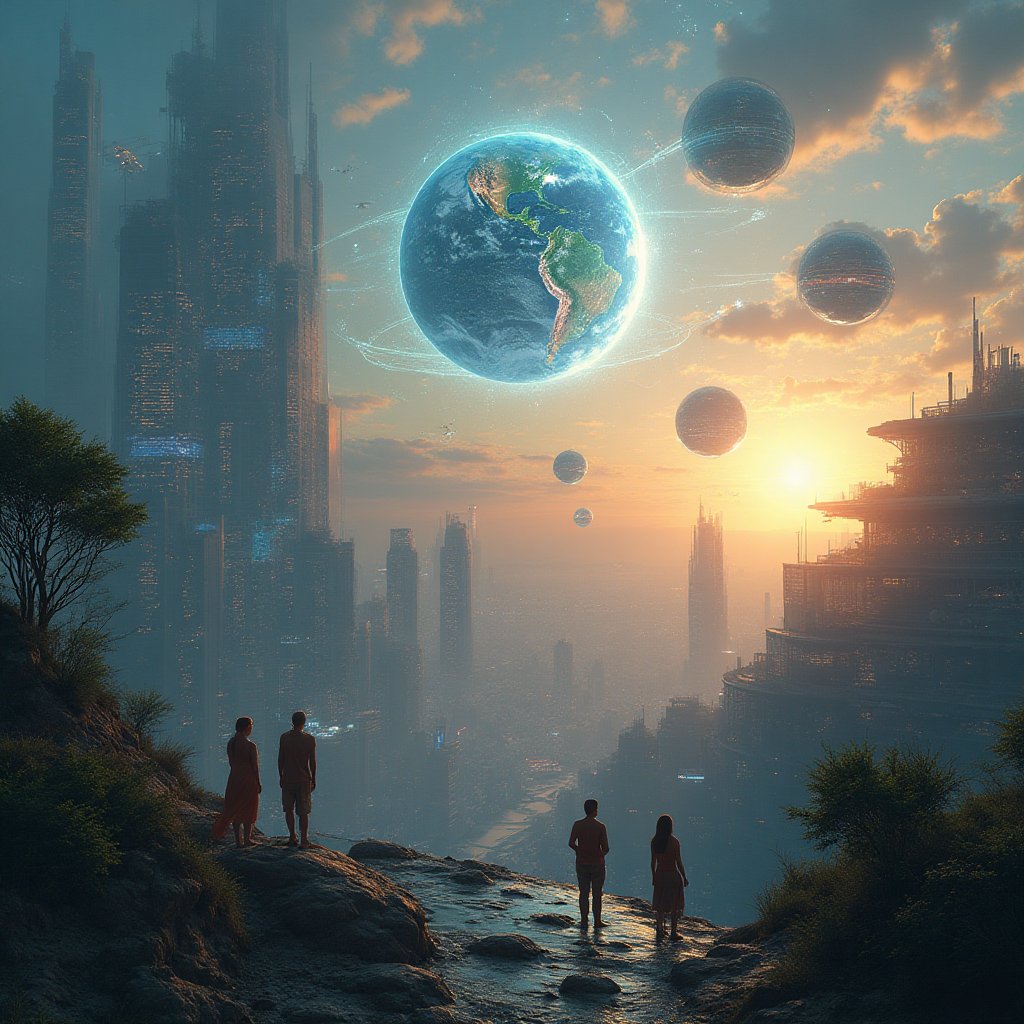In the era of rapid technological evolution, where each click and tap seems to thrust us deeper into the unknown, there emerges a beacon of innovation called Genesis. A change agent for robotics and artificial intelligence (AI), Genesis isn't just about spinning wheel gizmos. It's about reshaping the way we perceive and engage with simulations. Let's take the audacious leap into this world where imagination meets execution at warp speed thanks to the magical prowess of AI Revolution's brainchild platform.
Meet Genesis, an open-source ecosystem that's not merely a physics engine. It's a realm where high-speed, high-quality simulations are not a dream but a reality accessible to anyone possessing Python skills and a half-decent computer. Ascending over the barricades set by costly hardware and laborious manual processes, Genesis is poised to rewrite the rules. Equipped with the capacity to reach impressive speeds and function with dazzling simplicity, it confronts and conquers historical hurdles in robotics research. Its magic? Turning unrealized potential into kinetic engagement—right from someone's unpretentious laptop.
Breaking Down The Game Changer—Genesis
Picture this: Genesis generates simulations at speeds that our reality-bound brains can hardly fathom—up to 43 million frames per second (fps). For context, an RTX 4090 card under its command moves at 430,000 times the pace of real-time. Say goodbye to the slow and sluggish world of Isaac Gym and Mujoco! Genesis obliterates lagging platforms with 10 to 80 times more agility. The impact? Robots once taking decades to “learn” a task can now ace their training in mere hours. Imagine learning to walk, pick items, or manipulate tools with the ease of a film edited at lightspeed. Genesis builds an entire arsenal of experiences in one hour that might otherwise take years to realize.
The heart of Genesis is a formidable physics engine designed with an arsenal for handling varied materials and phenomena. It marvels in integrating solvers for dealing with rigid bodies, fluids, and even pliable, soft entities—all within a singular framework. And in a delightful sweep, it embraces the elegance of being natively constructed in Python, liberating users from the C++ complexities or CUDA dependencies that sometimes hinder innovation.
The Generative Wonders of Genesis
Genesis radiates brilliance beyond mere speed. It stands tall in generative power, where entire 3D worlds spawn from cryptic language prompts. As if waving a wand, typing a simple description in Genesis morphs into interactive scenes, task proposals, and dynamic character motions. Free from the shackles of manual effort that drags asset creation, researchers can instead plunge into deep waters of innovation and let creativity flourish. The time saved sings songs of progress as repetitive grunt work dissipates into energized focus on transforming ideas and breaking barriers.
Visual beauty is unlocked with Genesis' photorealistic rendering brimming with advanced ray tracing—showcasing simulations that perform and look phenomenal. When demonstrating ideas to academic peers or captivating investors, slicked simulations sound more than a credible tale; they weave attention-arresting narratives. Genesis ensures that inspiration doesn't just flicker or flag but shines through heroically.
A Gateway to The Future: 4D Dynamic Worlds
Genesis teases the imagination with hints about the frontier of future simulation as it delves into 4D dynamic worlds. Not only are these environments spatially multi-dimensional, but they incorporate the dimension of motion over time. Vision-language models are the secret sauce enabling users to sketch scenarios with mere words, which Genesis then conjures into palpable reality. Whether it’s generating camera movements, realistic object behaviors, or animations aligning with physical laws, Genesis does heavy lifting with an ethereal touch.
Moving beyond robotics, Genesis offers potential in gaming, animations, and AI-generated videos. Offering a tapestry of avenues for exploration, the frontiers beckon to artists and technologists alike. A kaleidoscope of innovation sparkles under the open skies opened by Genesis.
Scalability and Ease of Use: Genesis at Its Core
Scalability isn't just a feature; it's a philosophy embedded in Genesis' architecture. Capable of running up to 100,000 simulations simultaneously, Genesis brings an avalanche of data and outcomes, perfect for refining AI models fit for real-world application. Picture juggling thousands of robots in a concerto of activities—exploring millions of scenarios inside a virtual expanse where a misstep incurs no real-world consequence. Mastery of this scale marks Genesis as a flawless performer on center stage.
Affability crowns Genesis besides its prowess. Installation feels almost delightfully mundane with a simple PIP command. The intuitive nature of its API welcomes developers even with scant experience in robotics simulation, ushering them into the egalitarian temple of Genesis. The platform’s open-source spirit encourages community growth through contributions, bug fix requests, and new feature suggestions on GitHub.
Unveiling Ambitious Extensions
Genesis' roadmap exudes the thrill of grand ambitions—on the menu are differentiable solvers for tactile sensors and rigid body physics, paired with tiled rendering and enhanced JIT kernel compilation. The unveiling of a well-conceived generative framework portends a future filled with facial animation, character motion, and interactive scenic brilliance that promises to take this already versatile platform into uncharted territories.
The breadth and depth of Genesis support a wide range of robotic entities: whether it’s arms, legged entities, drones, or gentle softbots. With compatibility reaching across MJCF, URDF, OBJ, and GLB file formats, Genesis easily weaves into diverse projects. Indeed, the built-in ray tracing crafts simulations that captivate teams engaged in academia or those pitching visions to stakeholders.
Genesis In Action: Monumental Milestones
Already Genesis serves mouthwatering achievements on a digitally-anointed platter: physical simulations at up to 43 million fps on premium hardware, and rapid training of robot locomotion policies in no more than 26 seconds, present staggering metrics. It speeds past contemporaries by crafting environments 10 to 80 times faster, proving Genesis unbeatable in marrying speed, precision, and ease.
This empowerment of smaller teams and individual researchers to compete against massive institutional research establishments speaks poignant volumes. Genesis democratizes access, fueling a wave of innovation sweeping across robotics and AI sectors ye traditionally dominated by opulent entities.
Relish words of encouragement as Genesis invites you to participate in shaping its trajectory. Few platforms so transparently invite the free spirit of contribution, suggestions warmly welcomed in its bids to push beyond the limitations of existing solutions.
Conclusion: Unleashing Endless Possibilities
Embark on an exhilarating journey with Genesis—more than a tool, a democratizing force of high-quality simulations. It extends an invitation to all with a curiosity and fervor for robotics. Imagine the thrill of bringing a concept to life unburdened by constraints of the old guard. Genesis lifts spirits as well as barriers, ushering a new dawn of innovation filled with dreamers, creators, and pioneers.
The creators at AI Revolution have concocted something truly fascinating with Genesis. Rethinking what simulation platforms should be, they've crafted a tool that revolutionizes not just robotics but waves touching a spectrum of industries. Witnessing Genesis unlock potential reminds us that real innovation stems from empowering people to stretch their reach and soar past the impossible.
Consider, for a moment, the possibilities Genesis unfurls. Could it democratize robotics research to ignite innovations we can barely imagine now? Where might Genesis take budding entrepreneurs and seasoned researchers alike in our quest to redefine interaction with the world—a blend of atoms, bits, and dreams? Share your thoughts and visions in the comments below, and join the vibrant iNthacity community on this wondrous voyage towards tomorrow. Don’t miss your call to the digital realms—become a permanent resident, then citizen, of the "Shining City on the Web"! Engage, debate, share, and be a part of this unfolding story.
Wait! There's more...check out our gripping short story that continues the journey: The Iron Lotus
Disclaimer: This article may contain affiliate links. If you click on these links and make a purchase, we may receive a commission at no additional cost to you. Our recommendations and reviews are always independent and objective, aiming to provide you with the best information and resources.
Get Exclusive Stories, Photos, Art & Offers - Subscribe Today!


























Post Comment
You must be logged in to post a comment.